#Community safety
Text
Why The US Won't Leave Haiti Alone

youtube

#Youtube#haiti#gang violence#prime minister ariel henry#security crisis#armed conflict#international news#community safety#government instability#jimmy chérizier#g9
575 notes
·
View notes
Text
"DNI-Related Controlling Behaviors: The use of a DNI to try to enforce control over anyone who so much as ‘likes’ a post of theirs to an unhealthy degree, often backed up with social shaming, harassment, and callouts. The DNI may also be used as a social ‘trap’ to create an acceptable target for abuse. NOTE: While reasonable boundaries are good and DNIs are not by themselves red flags, this goes beyond reasonable boundaries and into unreasonable controlling behaviors. The use of ‘DNI’ in this criterion refers to all ‘boundary rule’-esque pages such as BYFs and other such things, not just DNIs.
"Vagueing, harassing, making callouts, or otherwise attacking people who are using the website as intended (i.e.- interacting with posts on their feed in any fashion without stalking the op) and likely did not see the DNI. Especially if the DNI is hidden or nonspecific and vague (ex- ‘no freaks’ or ‘standard DNI’), making them even easier to violate by accident.
"Frequently interacts aggressively with people who are clearly on their DNIs and then calls them boundary violators for responding to the harassment."
- Excerpt from "Safety in Alterhuman Spaces," a document by the Dragonheart Collective. Emphasis in the original. You can read the whole document here (PDF).
A note on language in the above quote: DNI (Do Not Interact) and BYF (Before You Follow) mean a type of post that many people put on their social media accounts to tell others about their boundaries.
#rated G#internet safety#quote#queue#harassment#online harassment#about DNIs and BYFs#The Dragonheart Collective#community safety
714 notes
·
View notes
Text
Hypnosis and Dissociative Disorders
I've been meaning to write this since Charmed.
I shall not point fingers or name names but during Charmed 2024 there was a 101 class that taught that it was unsafe to play with those who dissociate as part of a mental illness. The graphic, which I'll paste below, used the word "Can't".
I wanted to speak to that.
Hypnosis has several different definitions. One could go to a hypnosis event and ask every presenter "define hypnosis in a single sentence" and get a different answer every class, likely a few may even contradict.
One such definition I could use is "Hypnosis is an altered state where a hypnotee is lead to a suggestible state where the hypnotee is dissociated from their conscious thinking." though one could say it is "an altered state that leads to breakdown in critical thinking and a heightened state of suggestibility" or you could start talking about the unconscious or subconscious mind.
Fact is, there's a lot of theory work at play and the language we use to shape the concepts isn't as important as understanding the concepts.
Dissociation is a natural part of hypnosis. It's also a natural part of existing. In much pre-talk patter we as hypnotists tend to ask an introduction level hypnotee to think about their experiences with time dilation, with highway hypnosis, with spacing out, with walking into a room and forgetting why you came in there.
Things so normal that as part of rapport, a hypnotist tends to assume the hypnotee can latch on to one of the concepts.
Dissociation is a spectrum. Literally. Within psychology the DES-II tool grades dissociation experiences on a scale, hence the acronym.
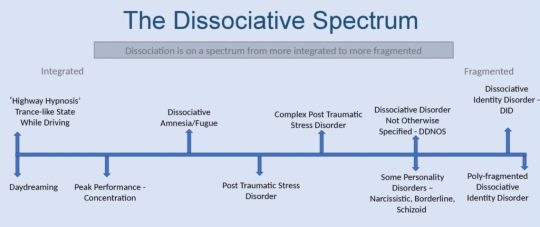
Graphic source
When people, including myself at times, describe dissociative disorders they tend to be referring to disorders that focus on dissociation as their main symptom. Depersonalization, Derealization and of course Dissociative Identity Disorder. Over the course of my life I have been diagnosed with all three.
But the scale includes Post Traumatic Stress Disorder, both complex and standard. Complex simply refers to a level of trauma that has been ongoing long enough that it is not a single memory or incident that triggers the symptoms.
According to the American Psychiatric Association one in eleven people will be diagnosed with PTSD at some point in their life with 3.5m diagnosed per year in the USA.
Which is to say that dissociating as part of an illness includes 8% of the population. Does that mean 8% of all potential hypnotees are too dangerous to play with?
...the answer is not a clear cut, "no". There is some elevated danger. But rather than teaching people not to play with those who live with these experiences, perhaps we can teach why there should be heightened caution and then allow people to navigate together.
We should always strive to educate and provide tools. When you tell a person they can't do something then they'll just do it without understanding why they aren't supposed to or, worse, predators will find those who were excluded from safer spaces. Harm is not reduced, an educator just gets to walk away from the harm with a simple "I said they shouldn't".
And plus, I said 8% of the general population...
Within hypnosis circles I assure you it is far higher when one factors in that multiple studies have supplied evidence that hypnotic susceptibility increases along with dissociative capacity.
Suffice to say, from utilizing hypnotic susceptibility tests (HGSHS) and dissociative tests (SDD and DES) the more a person dissociates, the more susceptible to hypnosis they are.
The human mind uses dissociation as a way of coping with physical and emotional pain, among other necessary inner needs, and so a person suffering from a mental illness that features dissociation becomes a naturally gifted hypnotee. It's a matter of practicing a skill constantly without realizing that they are refining something useful. Wax-On/Wax-Off.
This leads to a number of safety concerns. We've typed on serious concerns such as altering sense of identity and derealization attacks from lack of grounding. This is a topic near and dear to our heart as we acknowledge that we needed to gain an education in how to safely consent to hypnosis play and failing to do so in the past caused harm to ourselves and to those we played with.
So here's a list of potential dangers in playing with those who are further along the dissociative spectrum, how to mitigate those dangers and create a space where everyone can play safely.
I'll focus on hypnotees with dissociative experiences for the most part as the relationship between dissociation and hypnosis is primarily a concern while the hypnotee is in trance. That having been said I acknowledge that Dom Space connects just as much to the spectrum and an entire new post can be made on the topic of performing hypnosis when you have a dissociative disorder.
Heaven knows it is a topic I study feverishly to maintain safety for myself and those who entrust their mind to my care.
So... with that said, let's talk about the dangers.
Abreactions
This is likely the most common concept that comes up when thinking of the relationship between PTSD and hypnosis. An abreaction is the moment a hypnosis session or scene goes off the rails because the hypnotee is actively reacting to a trauma trigger while they are in a suggestible state. Their Fight/Flight/Freeze/Fawn impulse may be triggered and cause a physical or emotional reaction which was not part of the negotiated/planned scene.
This could be a cut and dry example of "and think about all the times you've been hypnotized right there on that sofa" causing a hypnotee to follow the suggestion and regress in memory to a time before a bad break-up when their former partner hypnotized them on the sofa they are currently on.
It could be an abstract example like "imagining yourself in a field of flowers and breathing in, noting how lovely the scent is, like the most beautiful perfume." causing sense memory to trigger the scent of a perfume that was in the air during a traumatic moment of their life that instantly flips the switch in their mind to go into F/F/F/F mode.
Likely any given hypnotist will experience this at some point in their life. The first example is one that any person could experience. Hypnosis naturally draws upon associations and when you create an association in the present to a negative emotion in the past you will summon it into the present.
With the second example, that association is already there and it was activated during the scene. The source of the abreaction. I avoid using the word "Trigger" both because of shitty internet discourse in the 2010s and because the term is used for other things in hypnosis, but that is what it is. A sense, a memory, an association which causes the source of trauma to intrude upon the present. The danger that the hypnotee experiences in these moments is very real.
Typically when I discuss these topics I put a disclaimer and emphasize how present the traumatic experience is. My hope is that anyone who is interested in hypnosis knows full well how true and powerful inner experiences are. If you doubt that then I sincerely do not know why you are in this community to begin with.
How to prevent an abreaction is important but should never be learned at the expense of learning how to handle an abreaction. Prevention is about disclosing during negotiation, asking the hypnotee to volunteer anything which may activate a negative reaction or simply what topics to avoid. Phobias are common enough examples of things that a hypnotist should know before working.
But disclosing every part of a trance or scene during the early phases of a hypnotic relationship is essential too. This way the hypnotee does not get surprised by anything propping up during play and they can measure their expected reactions before going into a suggestible state.
But if, despite caution, something does happen? What then?
Noting that every abreaction manifests specific to the person, their situation, their emotional state and how the scene caused it to happen. The first thing the hypnotist needs to do is not overreact. Over-correcting is an easy mistake to make in the moment but it will lead to an overall negative outcome.
Assess the situation and try to recognize what is happening. I had mentioned that the reflex is "Fight/Flight/Freeze/Fawn" this can be obvious like thrashing or ejecting out of trance instantly. It could be something harder to notice like locking up and becoming unresponsive or emotionally regressing to a terrified state.
If the hypnotee is still in trance then do your best to offer comfort and grounding. Remind them what is happening, remind them that they are safe, perform some grounding exercises such as box breathing (breathe in, hold, exhale for a number of seconds).
Touch is a case by case situation here. I know if I were having an emotional flashback to an assault then being touched would launch me further into abreaction territory. If you believe holding a hand would be beneficial then at the very least communicate it "I'm here, I'm going to take your hand, everything's safe, I'm here."
Over distance you should communicate this via modality. "I'm here, just listen to my voice, focus on the sounds in the room, I'm not going anywhere" for an audio example, "Just feel the blanket beneath you, you can brush your fingers against it if you need" for touch based.
The idea is to use emotional comfort, sensory grounding and patience to bring the hypnotee gently out of the moment.
Then apply aftercare and discuss what happened, what could be improved, what the hypnotee needs and acknowledge that the stress of these moments impacts the hypnotist too. Leave room for the hypnotist to recover as much as the hypnotee.
Decide together if this will end the session or not. Do not cut off on principal. If someone is conditioned to believe that displaying their negative reactions will lead to play stopping then they will hide those reactions. Accept that they happen. Learn how to grow together and incorporate care, comfort and safety into every scene.
Spontaneous Hypnotic Amnesia
One danger for those who suffer dissociative disorders is that their brains are very good at editing information. The further down the spectrum one is, the more adept their mind is at naturally pushing away things that they do not wish to think about nor have the capacity to integrate.
One categorization of dissociation is a failure for the brain to integrate information and experience. It is the cause of time dilation, it is why critical thinking is bypassed and it is why those further on the dissociative spectrum are able to compartmentalize their experiences so effortlessly that they can maintain dissociated personalities.
Where most people who practice hypnosis typically have to study how to achieve post-hypnotic amnesia, those who begin working with hypnosis with patholigized dissociative experiences may need to learn how not to experience it. I include this as I have spoken to multiple people who have lived this reality and it is something we ourselves experienced in the past.
Should a newer hypnotee show signs that they are not remembering what is happening during trance, it is a good practice to train them on how to retain information. Hypnotee Agency is a skill that one develops and allowing them the knowledge that they can chose to retain the information during a trance is as important as reinforcing how easy and normal it is to forget when that is a negotiated part of the scene.
All it takes to be safe here is to just remind them that if they wish to and find it enjoyable to do so, they may retain the information from this trance.
Nothing more complicated than that.
Derealization/Unreality
Derealization is a common experience within dissociation that is actually lower on the dissociative spectrum than PTSD. It is when you do not feel attached to your present experiences in real time.
A common version of this is "Deja Vu" which is a sensation where you are having difficulty integrating your present experience because it "feels" like you've already experienced it.
It can manifest in many other ways, however the commonality is that the person experiencing this knows that it's abnormal. When a person is disconnected from their surroundings like this they may experience a barrier between themselves and the world, they may have a distorted sense of time and they may become physically unresponsive and withdrawn.

Source: Mayo Clinic
The best way to handle this is to make sure that grounding always includes a thorough count-up that lets a person feel both in their body (this will help with depersonalization too) and aware of their surroundings. Ensuring both debriefing and aftercare focus on keeping reality in the room is important when someone's sense of what is real can drift.
For that reason it's a good idea to try and reinforce those ideas of what is real and save them in a little box that can be stored away if there are ever any reality altering suggestions in play, that way retrieving and unpacking that box can just be a natural part of the post-scene.
I linked it earlier, but my post on the topic can be found here.
Depersonalization/Altered States of Identity
Ah, our favorite soapbox.
Much like derealization, depersonalization is a symptom that is lower on the scale than PTSD and is actively invoked during inductions such as the Bandler which turns a handshake into the hypnotee starring at their hand and having the sensation of the hand distanced from their mind. Literally dissociating the hand from your body and using that sensation to build a trance.
It's a good induction. All forms of dissociation are not bad things. That is something I want to make sure an audience fully understands. This post is here to destigmatize, particularly when a 101 class was teaching stigma.
Depersonalization is a disconnection from one's sense of self. These are the moments when one feels like they are not the ones living through a moment, they are experiencing themselves from an outside perspective.
Once again, things that are utilized heavily in induction patter.
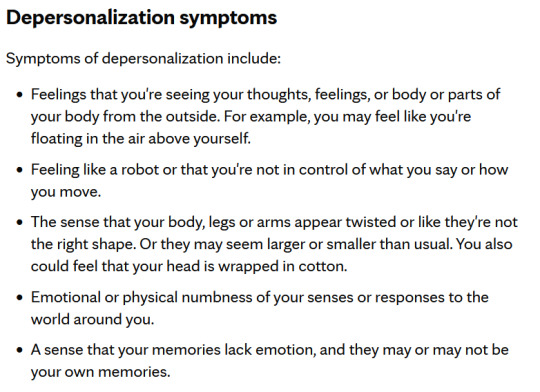
Source: Mayo Clinic
The derealization advice works well in this case, particularly the idea of creating a "back-up" to restore carefully at the end of a scene.
The big difference though is that depersonalization as a natural thing that those with dissociative disorders do can lead to some bleed when doing suggestions which alter a person's sense of self. I highly recommend an optional suggestion or affirmation that can help a hypnotee ground themselves. That may be too close to therapy for many though.
The hard part about being safe with depersonalization symptoms is that they are typically things that we actively engage with during hypnosis. I guarantee at least one person read "Feeling like a robot or that you're not in control of what you say or how you move." and thought of that as an absolute win.
This is where a bit of negotiation and hypnotee agency comes into play. Reality needs to be kept in the room during all hypnosis. Diving into ego-death or erasing reality may be tempting, especially for those who aren't particularly fond of reality or themselves, but it is too dangerous to surrender those things.
My definitive post on the topic has more information.
Though while I'm talking about altered personalities, I want to make something clear which I did not type about much in my Personality Play post...
Plurality
This is a topic on its own which could take on an entire post to itself. I may yet write it. If anyone has read our Madison and Belladonna stories they would know that they are written entirely based upon the life lessons Daja and I have been learning while I began therapy and was diagnosed with Dissociative Identity Disorder. Many of my lessons for how to safely play with plural systems are mixed in with the fiction.
When I say Plural I mean to refer to those who have multiple dissociated personalities, along with circumstances such as dissociative barriers.
There are as many displays of plurality as there are people who experience it. Every system is different. No two people are not on fire (awww).
So with that said, any play on either side of the watch is going to be lead with self-advocating. A hypnotic relationship involving a system (or more than one, even) will need a level of disclosure. Not just that a system exists but how that system manifests. What patterns are known regarding switches, what best works when an unexpected switch occurs, what levels of dissociative barriers exist between alters/parts, what terminology is preferred...
Wait, that's a lot to throw at once.
Our version of plurality is based upon Dissociative Identity Disorder. Which is to say that my system, originating via complex PTSD during childhood, used to have firm dissociative barriers between one another. This meant that, prior to diagnosis, you could have an emotionally charged conversation with me, Dawn, and then the next day Cammie will wake up and depending on the level of dissociation (typically but not always linked to stress or proximity to trauma triggers) will either not remember what happened during that conversation or will not carry the emotions that I had experienced. "Not remembering" can simply be "won't think about"
As I said, it's quite subjective. But the conceit is that with those on the DID spectrum will have a complete disconnect between parts/alters.
For those with less dissociation, but still experience plurality, they may not have amnesia or barriers between parts, allowing themselves to communicate with one another actively.
Within psychological communities there is eternal debate on all of these experiences and one of the more poignant debates is that the difference between DID and OSDD seems to just be a level of severity and that treatment and therapy tactics tend to move DID patients into the OSDD box and so they shouldn't be labeled as separate disorders.
These rules on amnesia, inner communication and emotional consistency between parts typically apply outside of disorders. I do not wish to engage in syscourse. But as above when I mentioned abreactions, those who practice with hypnosis know how capable a mind is to create hypnotically induced personalities. There are experiences outside of the DSM-V and that really shouldn't be a controversial statement.
A switch is when one part/alter trades out for another. The reasons are hyper specific to every system and cannot really be predicted without knowing their circumstances intimately. For instance the scent of lavender will draw me out without fail.
These can happen without warning and during hypnosis. Being cautious about body language, tone of voice and sudden changes in mood are the best you can do without guidance from the one with lived experience.
I'd also cautiously warn to end a scene and check in if there is an unexpected switch and there's no negotiated playbook on what to do in case of a switch.
The first Madison and Belladonna story tells the story of that very circumstance because that happened in my real life.
For safety it is best to try and communicate with the entire system over how to approach any aspect of hypnosis play. Exploring is a collaborative action and it can be a rewarding experience to find what works and what doesn't work. But it does take time.
For some basic "until I know better" rules, I'd say NEVER FORCE A SWITCH is a fairly basic rule, though. Also do not assume consent for a specific part/alter counts as consent for the whole system.
There is so much to say on this topic and I will likely revisit it at another point, but much of the safety tied up with DID and identity based dissociative disorders boils down to the fact that you are negotiating consent for a group and that you cannot always guarantee that the hypnotee at the start of a scene will always be present during the entire scene.
To that, I say treat switches like an abreaction, display acceptance and curiosity and don't get too hung up on the circumstances.
At the end of the day plural folx are just people too, just not person.
So... why did I write all this, anyway?
A lovely friend of mine recently joked that Charmed 2024 was the "Year of Plurality" and in a way they were right. I've been attending the event since 2020 and where my first had been a humble little class of 8 or so people on a Sunday afternoon ran by Vulpes Automata (Vulpes teaches the same class at Plural Positivity, albeit without the hypnosis content, a recording is hosted here) this year's event included many systems declaring themselves as such on their badge, both an in-person and online unconference that stretched beyond the time limits put in place and were feverishly well attended.
It has done my heart so good to see the safety and community growing and becoming more accepting.
It reminds me of the community's slow growth to accepting and embracing the transgender community in the mid-2010s.
Which is why I wish to be firm about trying to stop bad ideas from taking root in how we teach on these topics.
Some may remember that in the 2000s, respectable resources teaching hypnokink used to state firmly to "confirm biological sex" with any potential play partner. Said material has been revised. Times change and communities grow.
So when I see this teaching graphic saying that those who dissociate as part of a mental illness "Can't" be hypnotized, due to safety concerns? I get worried.
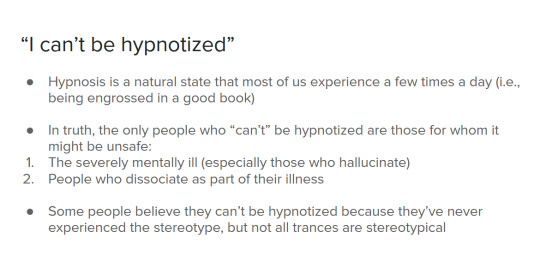
It was being used in a 101 class at the very same Charmed event that I am praising for having such good acceptance of plural experiences?
I lived this once as a closeted transgender woman. I don't want to live it again with our DID.
And I remember that "never play with anyone who has a mental illness" used to be taught in the same resources that once said to disclose one's "biological sex". People have taught this in classes and been approached by someone who had a mental illness and told how ignorant it was to teach that they could not be played with.
We, as a community, can do better.
I'd rather a 3 hour 101 become a 4 hour 101 and teach this material than to dismiss those who are the most vulnerable and susceptible and have them seek their trances from those who do not have reservations about safety and ethics.
Thank you for reading. I know this was a big soap box.
#dawn posting#hypnokink#hypnosis#hypnokink writings#charmed 2024#did#bpd#community resources#community safety
382 notes
·
View notes
Text
Reminder that when a stranger DMs you because they've picked up a message from your ancestors/spirits/gods, or because they've sensed that you're under a curse, or an evil spirit has attached itself to you, that is a scam at best.
Report and block.
677 notes
·
View notes
Text
just found a KFer on tumblr. all tumblr users pls be aware and make sure to report and block if you see these points in one account:
avatars will be 20-something white women that feel bookish, artsy or fandom, basic anime nerd, or unassuming picrew
they will mimic language and aesthetic depending on type of tumblr user they're trying to doppelganger
obviously bringing up KF in the positive, but rn predominantly stoking controversy about keffals, HRT, and talking about "TRAs" w/o actually using that term
they'll bring "receipts." they know photoshop & chrome inspector
they avoid common TERF dogwhistles. they know this platform can spot them easy and has terms filtered
KFers are smarter than TERFs and that's what you're looking for
they use trans hashtags but less hashtags than real users
i'm not being an alarmist.
seeing one means there will be more. pls be proactive.
#transgender#trans#important#community safety#i dont know what hashtags to use here#propaganda#queer#lgbtq#socialjustice#far right#transphobes
27 notes
·
View notes
Text
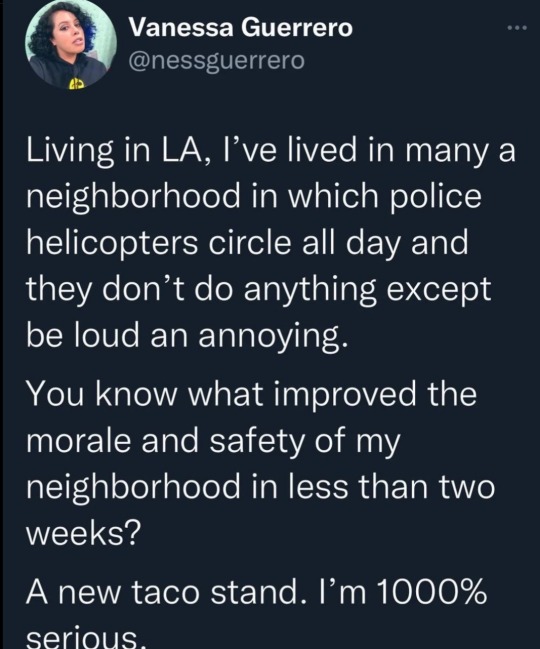

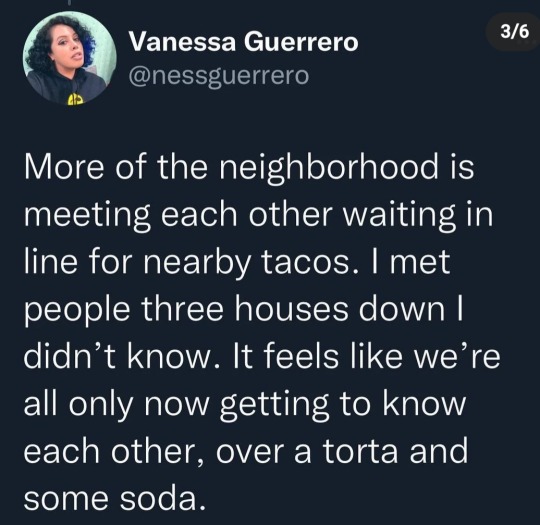

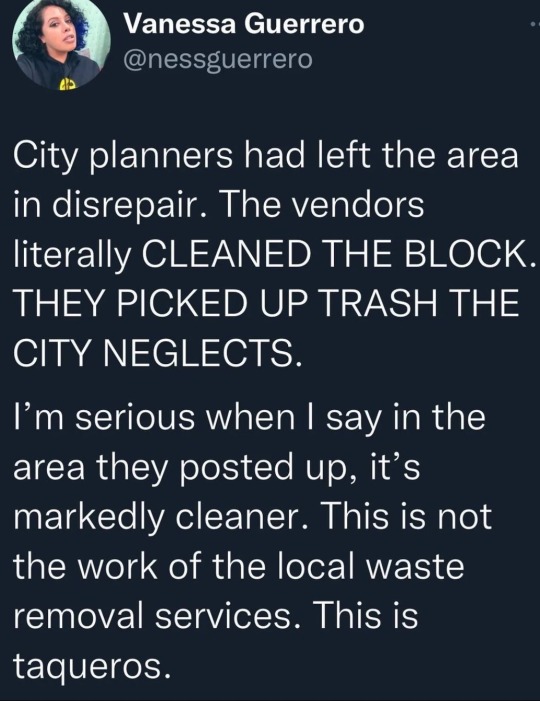
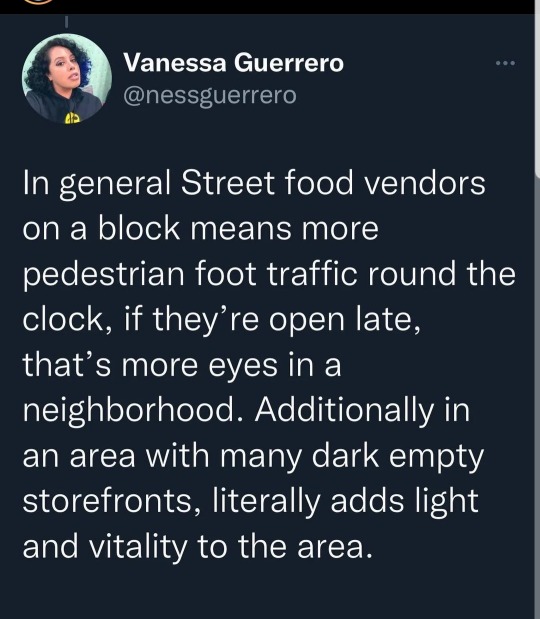
4 notes
·
View notes
Text

Day 3055 - Masks are no longer required while flying but I am sure as heck keeping mine on.
2 notes
·
View notes
Text
The end of online privacy
Now, this isn't something I usually post about from my silly goofy k1nk account (reminder to minors to not follow or scroll this acount).
But I have more followers on here than main, and this is extremely important. Like, scary shit.
This applies to everyone. If you're reading this? It's going to effect you.
I'm sure perhaps some of you have seen around about a this thing going around... KOSA, is one of the ways it's being referred to.
If this shit passes, lemme tell you...
LGBTQ+ adults and minors seeking help and community,
people looking for abortions,
people organizing protests,
anyone using their free speech to voice concerns about injustices,
even FAN ARTISTS...
Even people reading fan fiction...
And for the purposes of where I'm posting from... people sharing and enjoying their k1nks, wanting to post things with safety and privacy... smut artists and writers, people even LOOKING for smut...
It's all gone. No privacy.
They'll have your face, your name, your age, where you live.
You'll need an ID to use any US-based platform, even if you're NOT in the United States.
Instead of dooming, here's what you can do to stop this shit in it's tracks 👍

Here is a website where you can sign a letter just by filling out a form, (it takes less than 30 seconds) and where you can call reps.
I HIGHLY suggest leaving calls if you're able, and if you have phone shyness, do this after 6pm, since it will leave messages instead.
I'm shy, but I did it!
Here's another letter to sign, takes less than 20 seconds.
Here is a form you can fill out sharing how the social media has POSITIVELY effected you.
Share all of this with as many people as you can. Our safety, freedom, joy, and protection online is at risk more than ever.
(Here is the thread where I found all of this information.)
STAY SAFE!
#fav posts#txxxtpost#nsft#kinkblr#lgbtqia#lgbtq community#stop kosa#kosa#kids online safety act#internet censorship
40K notes
·
View notes
Text

#haiti#biden#fuck joe biden#gang violence#prime minister ariel henry#security crisis#armed conflict#international news#community safety#government instability#jimmy chérizier#g9#american imperialism
553 notes
·
View notes
Text
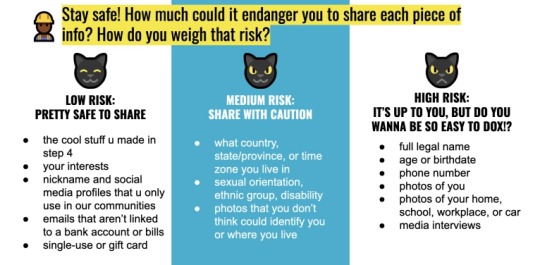

(The image descriptions are in the alt text.)
These are two slides from a presentation that I did together with my partner @who-is-page: "You Are Not A Museum Piece: Putting Yourself Out There In The Alterhuman Community." You can watch the whole presentation on Youtube here.
You can make informed decisions about your privacy on the internet, and pick and choose to make it just right for your own personal needs. It doesn't have to be all-or-nothing. A risk that's acceptable for one person may be too big for another person. These lists are based on sources such as the book The Smart Girl’s Guide to Privacy: Practical Tips for Staying Safe Online, by Violet Blue. We recommend reading it to learn more.
#rated G#internet safety#online safety#privacy#online privacy#internet privacy#safety#screen reader friendly#alterhuman#OtherCon#who-is-page#our art and writing#except for the emoji... they're from Dzuk's Mutant Standard Emoji#original post#community safety#from 2023#book recommendation
390 notes
·
View notes
Text
Ethical Personality Play
So. I've written about my experiences with Personality Play in the past. A couple times, actually.
The TL;DR is that from early 2000s-2019 this was my signature move that the first three hypnotists I was tied up with utilized on a near daily basis. The damage of this abuse has never been fully tallied, but if you want my "how to alter your personality with hypnosis" guide in a word it is simple:
Don't.
"But what if I want to do hypnotic edgeplay?"

But saving that... let me impart some wisdom in hopes that y'all will play nice and safe with this.
Firstly let me define the terms.
Personality Play is any form of hypnosis scene that alters aspects of the individual's identity whether it be for a scene, as a permanent trigger or as permanent conditioning. The danger amplifies with the more severe and lasting the changes are but there is always danger.
So, let's cover each area of what can be done, how it can be harmful and how to avoid that harm.
General rules
Before even negotiating this kind of play. Disclose.
If you are engaging with intimate hypnosis at this end of the danger spectrum then you need to have a level of intimate trust relative to that risk and this trust needs to go both ways. If I were a hypnotist introducing this kind of play into the mix I would do so only if I could trust in my hypnotee partner's mental state.
I disclose my BPD and DID at the start of any hypnotic relationship and talk about how they impact me. How the depersonalization and derealization symptoms require a level of grounding before and after play and what to do if my emotional state switches during the middle of a scene. This is not an easy thing for me to do, especially if time is a limited factor, but it's a necessary thing to do.
I do not expect every person playing be willing to disclose every mental condition they have or open up about possible abreaction triggers. That's sensitive information and it's natural to not want to be open about that with every partner. I do, however emphasize that it is vital for that information to be known when approaching these topics. It is unfair for the partner in the scenarios to be responsible for managing safety on either side of the watch when they are unaware of the depths of vulnerability.
I have experience with this fallacy myself. In utilizing hypnosis to ignore my triggers I did severe damage to myself and I am now plagued with intrusive memories and nightmares of events that happened during scenes that I was able to effortlessly indulge in during the scene but as they say "The body keeps the score" and I was in fact doing further damage to myself. Something which my partner at the time was not equipped to deal with because I'd failed to disclose or even treat the situation as worth being safe about.
Now I am just burdened with further damage by ignoring my brain's defenses on my existing pain.
Once again, I refer to my first bit of advice on how to ethically perform Personality Play: DON'T.
Once you have a trusting understanding of both sides of the watch's limits and comforts the next step is grounding.
Grounding is mandatory.
I wrote about my feelings on this before in more depth. The short version, though:
Before and after a scene with intense reality distorting you should take an effort to make a person feel aware of their surroundings, to offer them connection "during the scene you will know I am here and you can pause the scene at any time for any reason" and for them to take stock of their mental state and how they are feeling. Just ask them to display curiosity and provide comfort in the connection between hypnotist and hypnotee. You will be returning here and you need to make it an inviting space.
Grounding should also include a reminder that the hypnotee will be aware of what is happening the whole time. I'll cover this more in the more risky portion, but the key to safety is to ensure that the hypnotee is not immersed in any headspaces they may slip into (with the understanding that there is another gradient here of subspace and highs and peaks from scene play which are chemical reactions and those highs are a little more natural than the altered headspaces I am referring to).
For another grain of personal experience and warning here, I just want to talk about the three hypnotists who played with me utilizing personality play. One knew what he was doing, one didn't know what they were doing and one didn't care. I'll refer to them as Noel (knew better), Dinny (didn't know) and Carrie (didn't care).
Dinny expected that if a scene got too much for me that I would drop out of trance or end the scene. To them they assumed that no one will do anything in hypnosis that they didn't want to do and that it was just extreme play-acting. They likely didn't believe in hypnosis all that much and used it as a framework for roleplay, which is their true indulgence.
So if a scene got too intense for them they would safeword. End the scene. They were in control.
As someone who was immersed in the play and had no grounding, there was no escape because within the framework of the scene, there was no "out of character" there was the scene and that was all that was happening.
You cannot assume that a hypnotee will safeword and end a scene unless they receive the proper grounding and instruction to do so. If you're going to be doing edge play, you have to surrender the fantasy and make sure reality is in the scene at all times. Both sides of the watch. If you are entering in a scene where a person is altered throughout then you cannot expect them to act on their agency. It's a CNC scene by default and you need to introduce safety and consent to avoid that.
Likewise I want to note the power imbalance that comes from play like this. A motivated hypnotee can fling themselves into this arena and do harm to the hypnotist. This does fly both ways. A hypnotee not advocating for themselves or exercising their agency will make a hypnotist accessory to the damage.
This is a sin I have committed.
A hypnotist has a responsibility to themselves to not allow a self-neglecting hypnotee use hypnosis as a method of psychological self-harm. This guide is as much to protect a hypnotist from being abused as it is for hypnotees to avoid allowing themselves to be abused.
Every side is vulnerable in these exchanges.
So... now that we understand the basics before we can even start, let's start in the shallow end and work out way up.
Emotion Control/Intelligence Play
Starting soft. This is fairly standard play and so long as you're being mindful I doubt many would have too many problems with these suggestions.
Infatuation potions, ditzy spells... this is fairly standard stuff.
The key thing to do is to ensure that the effects are temporary and impersonal. For instance for an intelligence play scene you may want to picture a dial in the hypnotees head that has a default setting. Take a moment to ground that default setting. What is normal. What it feels like out of hypnosis. Then you can suggest that it will always return to this default setting after a time but for now we intend to dial it back down, as you feel yourself growing sillier and sillier.
This is a safe way to handle a scene like this because even if you do not perform a post-session grounding (which you always should), the default will naturally return.
Likewise infatuation potions you can mention how your body will metabolize and you'll be aware of the artificial nature of the emotions you feel.
Being aware of the artificial nature of the emotions at play will prevent lingering effects. Even after you clean up there will always be a little bit left over and it's a matter of limiting how much sticks around and where the mind will return to.
I safely play with suggestions like this to this day even when Personality Play in the broader sense is Red for me. This is safe. It's manageable. It's temporary and with a partner who is willing to make space for it, you can keep reality in the room. Safe and secure.
But it can still be dangerous.
Let's see the intelligence play scene was handled poorly. Instead of a temporary dial which defaults to normal a hypnotist instead asked "Debra" to imagine herself with platinum blonde hair, a larger chest, all her thoughts evaporating into a pink bubblegum mist as boundless confidence overcomes her until she transforms into her bimbo persona, "Debbie" and Debbie can be summoned at a simple turn of phrase.
That right there? That's DANGEROUS.
We'll cover more as to why when I go over persona/character play, but it's a good example of how a "bimbo trigger" can be performed ethically and how it can be performed dangerously.
*sighs*
So let's move on...
Altered Headspaces
By altered headspaces I mean suggestions and scenes that play on your ability to perceive and process things. This can be the drugged/drunk sequences, hallucinations of any variety. It can be impulsiveness or boosts of confidence or terror.
Y'know. Stage hypnosis stuff. Because as we know, stage hypnosis tricks are a bastion of "ethical" suggestions.
Seriously though. The prevalence of these types of suggestion in the public perception make us as a community look bad and it's why doing them safely is vital, especially if we do get people entering the community with the idea of types of play which are risky at best from the get-go.
For these suggestions you want to provide the above grounding, but the hypnotee also needs to be able to have an objective view to their state so they can advocate for themselves.
Any altered headspace will supplement agency. It's why you cannot negotiate with someone when they are fractionated. Thusly, any interaction you have with someone in an altered headspace is going to be dubious consent by default. What if you made someone slutty for a scene and they escalated the scene to a sexual one without prior negotiation or existing rapport.
The correct thing to do is end the scene there and then. Otherwise the hypnotist is taking advantage of the hypnotee.
That's a fairly plain example, too. Hence why I feel even this level is edge play.
I don't particularly want to share my personal experience in this realm. Suffice to say I've never once in my life had lucid sexual intimacy with a partner. Every single time I was altered. I literally cannot approach the concept/act without being altered first. I invited it.
The body keeps score.
The way to practice this safely is to encourage the hypnotee to maintain an awareness and presence in the scene. There is a risk to this as incentivizing a dissociation between the conscious self and the altered self is the exact thing we are trying to avoid in these scenarios.
I refer again to the shining DON'T at the top of the post.
But with the correct grounding and temporary status of any scene this risk is lower than the risk of allowing a hypnotee to dive into a scene so heavily that they will ignore their personal ethics and safety for the consideration of the scene at play.
It's either allowing them the ability to advocate for themselves while altered, "the hidden observer will always be present during the scene and can stop things for any reason or just to check in" basically it's keeping reality in the room. A hypnotee should be discouraged from throwing themselves headlong into the fantasy and an awareness of waking self and the artificial nature of play is important, particularly the more immersive you go...
So...
Character/Persona Play
Which brings me to the final warning.
Please do not even attempt this. I see kids in tulpa communities and roleplayers who can't see the harm in becoming their characters and I wish I could share a grain of my experiences.
I did this for 18 years. Eighteen years. Daily. The damage it has done to me is never ever going to be fixed.
The thread I made on Twitter received a number of supportive messages from others with dissociative disorders who echoed my sentiments. I'm legitimately at the point where I ask "were we attracted to this type of play because we were predisposed to it" or "do we have serious disorders due to our time playing in the deep end"
Neither one need to be true. Doing so did damage. A lot of damage.
So here's my first question off the bat.
"What if your hypnotist gets hit by a bus?" what if one day you wake up and you no longer have someone to explore this gigantic portion of your soul with. What if access to this kind of play existed only within a relationship. Are you willing to allow that much of your personal experience and agency be left to someone else's hands?
What about trust. Can you trust someone to shape a part of yourself? Dinny, Carrie and Noel each did harm in their own way handling the bits of me I shared with them. Noel warped and twisted and perverted them to the point of which these characters, real and living aspects of me feel violated by his impact upon them. Carrie abandoned them and let them wither and die without even considering attachments I had made to them... attachments they had to the stories and connections they had made... and then Dinny? Dinny never treated them as real. They were fantasy and the situations were fantasy and it was all just a game.
Let me tell you about that last one. If you want to play out a hateship scene and utilize hypnosis to make your partner think that they are in that hateship scene, the emotions exist. They will bleed through and poison you in your waking state. If you are made to perform as a vampire who wants nothing more than to taste flesh then you are going to feel that desperate hunger and be trying with every fiber of your being to overpower the hypnotist who has the ability to end the scene if things get rough but, and this is the important part, unless you set up grounding-- you will not know that in the moment.
I legitimately have nightmares about the things I did while acting in scenes Dinny ran.
And lastly...
Are you willing to accept that there are parts of you that can do things that you in your waking and natural state, simply cannot do?
I do not know if doing these things makes you more vulnerable to the symptoms of a dissociative disorder or not, but I know that a damn lot of people who did this stuff excessively happen to have these symptoms.
Look. I don't hide my DID diagnosis on Tumblr. It hurts that I have a mesmerizing Fae in my heart who is more lovable than I am, more confident, more capable, more experienced and charming. I hate that she can perform feminine voice better than me. I hate that she can push boundaries and harm me without a thought. I hate feeling inferior to me. I hate feeling like I'm just a function of a person that people want around more.
I hate finding evidence that she had a whole online life that we hid so well that even post-diagnosis I am not fully sure what she did. I hate feeling powerless that I'm not in control of my own life and reality.
Dawn scares me. I am afraid of the part of me that most people love.
...and I have no way of communicating that as a warning that doesn't sound exotic and enticing. Because dissociative disorders are not exotic and enticing. They're boring, exhausting and tedious and though I am 50/50 on whether it can be accidentally induced through hypnosis play, I know there is no damned chance in hell any person should willingly gamble with that possibility.
I know so many systems and people who have endured extreme brainwashing who would be behind me when I say this.
DO. NOT. DO. IT.
...and so... assuming you have read all the warnings and you're not actively trying to invoke installed personalities into a person (which I do not condone under any circumstances at all).
How can we do character play and not leave lasting damage?
That's a question I have asked myself so so many times.
Firstly, avoid anything that makes the character headspace an extra layer. Do not use hypnosis to mold them. Do not give them their own triggers. Do not do anything which can be used as a divide between the waking self and the constructed persona.
But that's more "Don't" isn't it. Here's what you can do.
I think the best way is instead of having the hypnotee monitor the scene and step in when they need to, ask them to treat it as a performance. That they are aware of the artificial nature of the scene but at all times they will commit to taking on the role as an actor would on stage.
The key is to associate the role with the hypnotee enough that they are present in the scene while allowing them to commit to the actions without experiencing the thoughts and feelings of their own. Insist that no matter the morality and behavior of the character, the hypnotee as the actor will never cross their personal limits or ethics for the sake of the scene.
Then at the end of the sequence be sure to end the scene and ground the hypnotee, have them remember everything that had happened, remember them performing the act and deciding how to handle every decision. Make sure that the entire time that character and actor are one and the same and all hypnosis is doing is allowing the actor to invest in the bit.
That is legitimately the only safe way I think one can engage in this kind of play and from that angle it seems as harmless a suggestion as any scene.
But no shortcuts. No triggers that induce character headspace. No trying to breathe life into characters and allow them to inhabit. Even channeling them or letting them speak through the hypnotee courts a level of dissonance between states.
It's possible to enjoy the spontaneity of character play without suppressing the ego of the hypnotee. As I mentioned at the start, it may seem like a desirable outcome for some hypnotees to experience a state of ego-death and allow themselves to experience becoming someone else for a little while. It sounds appealing on paper.
A responsible hypnotist should never indulge that kind of desire and a respectable hypnotee should never burden a hypnotist with that level of responsibility. The damage is too risky.
Lastly, and this applies to all.
DEBFRIEF
Every major scene in any kink should involve a debrief segment. This helps with the grounding and it helps establish the in and out of scene dynamic while allowing the hypnotee to associate with their actions. "I did" rather than "they did".
One of my bigger mistakes in character play in my younger days was that I baked amnesia in and allowed my play partner to tell me about the scenes after the fact. This made it seem like the characters in the scene were the ones controlling things and I was a passive and absent spectator. Not good for healthy associations.
During a debrief the hypnotist and hypnotee should discuss their roles in the scene, how they felt during the experience. It gives both parties an opportunity to interrogate how the other is perceiving things, catch any flags (abuse of control over the scene, losing reality to fantasy etc) and give one another ideas for how to improve for future scenes. Debriefs make all kink play better in my opinion. Plus who doesn't like a bit of feedback on how you handled things in scene?
...look... I don't want to be an old lady yelling at the kids for doing things when I did them myself at that age.
I'd be a hypocrite if I didn't pretend I didn't see the allure on both sides of the watch.
I just... there weren't 20+ year experienced hypnosis veterans who had been in my character play abusing position when I was growing up. No one warned me. I learned all this the hard way and I hurt people. People I loved. Moreover I hurt me. In ways that will never heal.
I just want to spare anyone I can the pain of going through this.
So, in quick summary:
Ensure reality is always in the room.
Ensure the hypnotee is always aware of themselves and their action.
Reset after every scene.
Do not allow situational scenes to become direct triggers.
If you insist on reusing altered headspaces and characters then install and deinstal every time to limit any lingering traces out of scene. Do not allow them to have programming/conditioning unique to them.
Avoid allowing the hypnotee to circumvent their own ego and agency in a scene.
Debrief
Play safe... if you must play at all.
262 notes
·
View notes
Text
everyone should let it sink in, as scary as it is, that if you are part of a group that faces hate you may become subject to the same atrocities that we are witnessing in Gaza. the fascists and right-wingers use the same playbook. you may not be a safe as you think/hope. please, if you are fit enough to learn to defend yourself i implore you to learn. if you are unable to, find people who can protect or shelter you. if you have a space to grow food, or you know how to sustainably do so, work with your communities to prepare. we all need to come together because the hate that has been planted in our societies is growing, and hate is one of the most powerful forces of organization when it comes to gathering violent actors. be watchful, stay safe, love each other. i hope that we can all live to see a better world ♥️
#mutual aid#self defense#tw violence#tw state violence#tw hate crimes#tw genocide#community safety#communal organization#hope
1 note
·
View note
Text
Safeguarding Coastal Communities: MGB Conducts Vital Coastal Vulnerability Assessment in Caraga Town
Scan the QR code to get this post on the go.
In a proactive move to monitor climate-induced hazards, the Mines and Geosciences Bureau (MGB) recently conducted a comprehensive coastal vulnerability assessment in Caraga town, Davao Oriental. The aim was to analyze and address potential risks posed by erosion, tsunamis, storm surges, and sea level rise in these inherently susceptible coastal…

View On WordPress
#Caraga Town#Climate Change#Climate-induced Risks#Coastal Vulnerability Assessment#Community Safety#Data-driven Policies#Davao Oriental#Disaster Risk Reduction#Environmental Hazards#Infrastructure Protection#Mines and Geosciences Bureau#Natural disasters#Resilience#Shear Line Impact#Sustainable Development
0 notes
Text
Spartanburg Community Faces Tragedy in Wake of Deadly Shooting
Spartanburg, SC – A fatal shooting incident on February 21, 2024, near 155 Halsey Avenue, has left the community in mourning and searching for answers. The Spartanburg County Sheriff’s Office, alongside the Spartanburg County Coroner, Rusty Clevenger, have been at the forefront of the investigation, providing critical details as they unfold.
Responding to reports of gunfire at approximately…

View On WordPress
#Community Safety#Coroner Rusty Clevenger#Forensic Examination#Gun Violence#Homicide Investigation#Law Enforcement Response#Public Assistance Request#Spartanburg County Sheriff’s Office#Spartanburg Shooting Incident#Tayshawn Khalil Thompson
0 notes
Text
The Murder of Jonathan Lewis: Echoes of Injustice and the Double Standard in Media
The Incident: A Detailed Account of a Senseless Tragedy
On the afternoon of November 1, a seemingly mundane dispute tragically escalated in an alley near Rancho High School in Las Vegas. Jonathan Lewis, a 17-year-old student, was violently assaulted by a group of his peers, leading to a heartbreaking outcome.
The Spark of the Conflict
The confrontation began over a pair of stolen wireless…
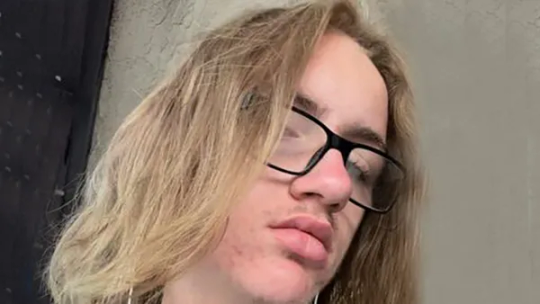
View On WordPress
#activism#advocacy#American justice system#assault#black-on-white crime#blunt force trauma#bullying#cellphone video#civil rights#Clark County#Clark County District Attorney#community response#community safety#court case#crime prevention#crime reporting#criminal justice#Diversity#equality#ethical journalism#ethical reporting#FBI investigation#grassroots movements#hate crime#head trauma#high school students#human rights#inclusion#inequality in media#injustice
0 notes
Text
youtube
🎙️Missing successful black peoples. Why? Beware of your surroundings when traveling and simply commuting.
👀
👂🏾
🤔
0 notes